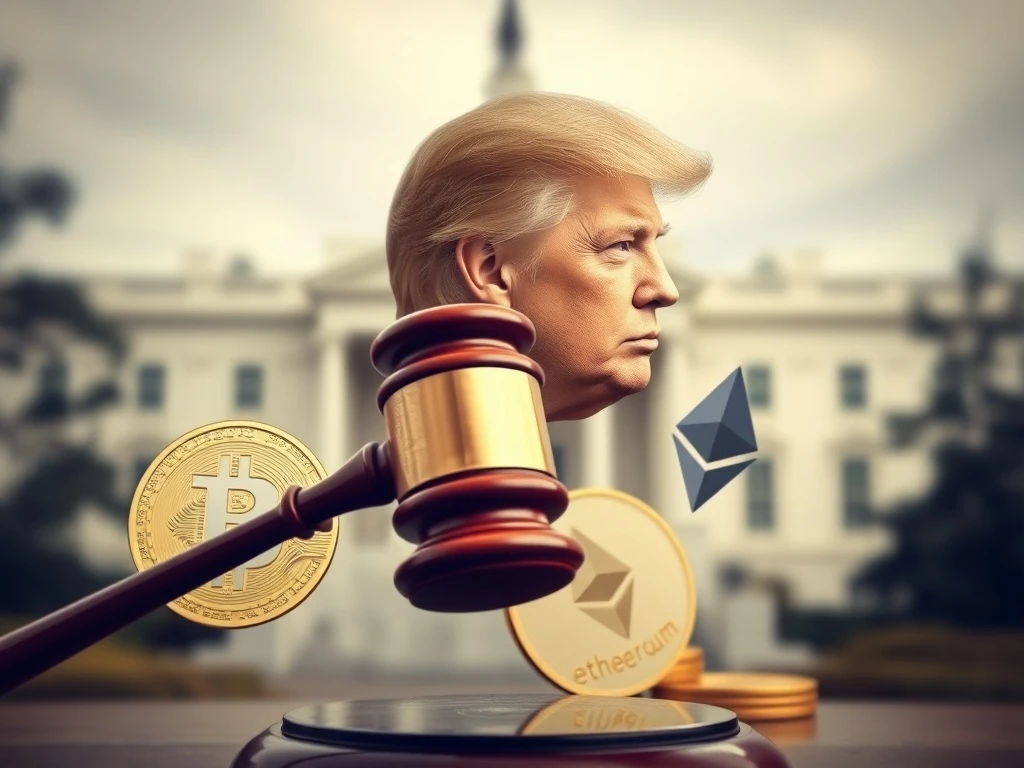CFTC Chair: Trump’s Crucial Search Amid Regulatory Uncertainty

The political landscape surrounding cryptocurrency regulation is currently experiencing significant shifts. A crucial leadership position within the Commodity Futures Trading Commission (CFTC) now faces unexpected hurdles. Reports indicate that former President Donald Trump is actively considering new candidates for the vital CFTC chair role. This development follows a dramatic intervention that stalled a previous nomination, directly impacting the future of crypto regulation in the United States.
The Stalled Nomination of Brian Quintenz
Former President Trump is reportedly exploring alternative leadership options for the Commodity Futures Trading Commission. This exploration began after the nomination of Brian Quintenz for CFTC chair faced a significant roadblock. In July, Quintenz’s confirmation process came to an abrupt halt. This pause occurred following a direct appeal to Donald Trump by Tyler Winklevoss, co-founder of the Gemini exchange.
Winklevoss expressed profound frustration with the Biden administration’s approach to his company. He stated, “7 years of lawfare trophy hunting. It’s outrageous what they did to us.” Consequently, the White House requested that the Senate postpone the scheduled vote. Earlier this month, Quintenz publicly suggested on X that Trump “might have been misled” by the Winklevoss twins. He even posted screenshots of private messages to support his claim. This incident highlights the intense political maneuvering behind key regulatory appointments.
Winklevoss Twins Flex Their Influence on Trump Crypto Policy
The situation vividly demonstrates the growing influence of major figures in the crypto industry. The Wall Street Journal specifically described this scenario as the Winklevoss twins “flexing their Washington influence.” This comes after their significant financial contributions to Trump’s political campaign, amounting to millions of dollars. Their ability to directly impact a high-profile nomination underscores the increasing intersection of cryptocurrency and mainstream politics.
The CFTC itself faces significant challenges. The agency is currently understaffed, with only acting Chairman Caroline Pham remaining after several recent resignations. Furthermore, the agency anticipates gaining expanded oversight of crypto assets under pending legislation. Therefore, the appointment of a permanent, influential CFTC chair holds immense importance for the entire digital asset ecosystem. The ongoing search by the Trump crypto team signifies a pivotal moment for regulatory direction.
New Candidates Emerge for the CFTC Chair Position
Amidst the stalled confirmation of Brian Quintenz, the Trump administration has begun discussing a new slate of potential candidates. These individuals bring diverse backgrounds and experience to the forefront. One prominent name is Michael Selig, who currently serves as chief counsel to the Securities and Exchange Commission’s crypto task force. Selig also has prior experience as an asset management attorney, bringing a strong understanding of financial markets.
Another candidate under consideration is Tyler Williams, a Treasury counselor specializing in digital asset policy. Williams previously worked at Galaxy Digital, a major player in the crypto investment space. His background provides direct insight into the digital asset industry. The selection of either Selig or Williams could significantly shape the CFTC’s future approach to crypto regulation. The administration, while not officially moving away from Quintenz, has intensified discussions about these alternatives. The direction of Trump crypto policy hinges on this crucial decision.
Fostering Crypto Advancement and Future Regulation
The Commodity Futures Trading Commission has recently taken steps to foster the crypto industry within the United States. For example, the agency initiated a “crypto sprint” program. This initiative aims to allow offshore exchanges to serve U.S. citizens, broadening market access. In August, the Commission also launched an initiative to enable the trading of “spot crypto asset contracts” on CFTC-registered futures exchanges. These actions demonstrate a proactive stance towards integrating digital assets into traditional financial frameworks.
A pro-crypto agency head would likely accelerate the advancement of crypto-friendly legislation in the U.S. Such a leader could streamline regulatory processes and provide clearer guidelines for businesses operating in the space. The ongoing political discussions surrounding the CFTC chair, including the influence of the Winklevoss twins and the fate of Brian Quintenz, will undoubtedly shape the future of crypto regulation. The final decision by the Trump crypto team will have lasting implications for innovation and investment in the digital asset sector.







